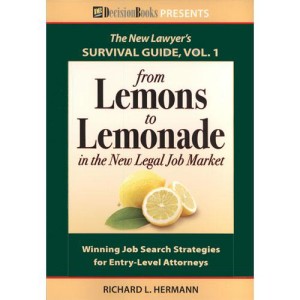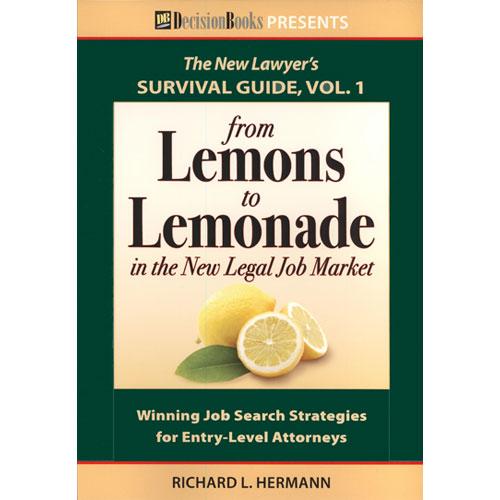 I recently received an email from Lawyer Avenue, asking if I would like a review copy of From Lemons to Lemonade in the New Legal Job Market by Richard L. Hermann. Hermann is a professor at Concord Law School and ran Attorneyjobs.com before it was sold to Thompson Reuters.
I recently received an email from Lawyer Avenue, asking if I would like a review copy of From Lemons to Lemonade in the New Legal Job Market by Richard L. Hermann. Hermann is a professor at Concord Law School and ran Attorneyjobs.com before it was sold to Thompson Reuters.
The book sounded interesting so I told them to send one along, with the caveat that it won’t sway my opinion on the book. They agreed and put it in the mail.
Lemons to Lemonade
As I stated in my review of Solo By Choice, the job:
There’s a lot of noise being made about new lawyers going solo straight out of law school. Considering the dismal market for legal jobs, many new law grads are headed towards solo practice out of necessity. A large number of the people I graduated with headed deliberately into solo practice, with no desire to work at a firm.
This book focuses instead on people who don’t want to go solo but want to find some sort of career path but are having difficulty in getting hired (note: there is a section on solo practice but it is brief – if you want solo career advice, buy Carolyn’s book).
The book is broken down into three broad categories:
- The Untapped Legal Job Market
- Getting Started
- Proactive Job Search Strategies
The Untapped Legal Job Market
Much of the focus of From Lemons to Lemonade focuses on “hidden” jobs in the legal job market. The cold, brutal truth is that there are just not enough “mainstream” (law firm) job opportunities to absorb all the new lawyers that are being cranked out of law schools. Unless you are at the very top of your class or have good connections, it could be tough to land a “mainstream” legal job at the moment.
So as opposed to focusing purely on scoring that firm job, Hermann encourages new graduates to also look for “JD-preferred” positions. Corporations, the government, trade associations, universities, hospitals, etc. are all places where lawyers may find it easier to find an employment opportunity. Since so many new lawyers have tunnel vision purely for a “mainstream” legal job, the competition is likely to be less.
| Pros | Cons |
| Greater Civility | Reduced earnings |
| Geographic flexibility | Less marketability |
| Job security | Less prestige |
| Less stress | Difficult to return to practice |
Hermann also focuses on what he refers to as the “hidden” job market. As most people know, very few job vacancies are actually posted. People and organizations prefer to do hiring via word of mouth and connections. Hermann provides many areas of possible job information that many job seekers probably over look.
There is a laundry list of organizations, associations, newsletters, reports etc. to peruse for information.
Getting Started
Hermann right away gets down to the most important thing when searching for jobs: social media.
Just kidding, Hermann emphasizes right away that person-to-person networking is the most important thing to do. Social media, Linkedin, etc are given pages sure, and Hermann praises them as valuable tools. But they are not substitutes for actually getting out and meeting people.
This section breaks down how to begin to search for jobs. If your answer is: “Any moron can do that, just type ‘lawyer job’ into Google” – A) I can’t believe you got into law school, B) you need this book. Mostly, this section deals with the psychology behind the job search; from both the employer and candidate viewpoints.
- What is that employers are looking for?
- What are the most desirable traits in a candidate for a job?
- How to dissect a job ad.
- Common mistakes by candidates.
Proactive Job Search Strategies
The final section of the book focuses on credential boosting programs and how to polish your marketability as a candidate.
There’s a lot of good stuff here, none of it really groundbreaking – except for one item Hermann refers to as a “Contacts Roadmap.” I’d never heard of it before and it’s quite brilliant. In Hermann’s own words:
…the Roadmap’s greatest value seems to be its ability to boost a candidate’s self-confidence, help overcome any inhibitions you might have regarding networking, and – even more than a resume – demonstrate to prospective contacts that you bring something tangible and concrete to your job search. Like nothing else, a Contact Roadmap will force you to carefully and methodically think through your job-search goals, and to document them in considerable detail…
It’s one of the best pieces of job hunting advice I’ve seen.
There is also a 40 page appendix in the book listing networking organizations, credential-building programs, job-hunting resources, organizations that regularly fill “JD-preferred” positions, etc.
[hr]
All in all, Lemons to Lemonade is a pretty good book. Much of the information it contains could probably be aggregated and collected online – but it would take a lot of time. The convenience of having this many resources already collected and categorized is substantial. Potentially more valuable is the psychology behind the book. It’s easy for job seekers to feel defeated. Lemons to Lemonade devotes a substantial amount of time to developing and nurturing an appropriate “hirable candidate” mindset. Valuable if you’re not feeling particularly good about your job prospects. Plus it contains details on how to develop a Contact Roadmap – a really neat piece of networking strategy.
If you’re a law student or a new, unemployed lawyer looking for a job – at $30 I’d say the book is an easy buy. It’s not going to find a job for you – but it will provide resources to find job opportunities as well as help you develop strategies to network, market, and land a job.
Click Here To Buy It Now













